If you’re new to AntiCancer360… this article explains our outlook on cancer treatments, natural anticancer strategies, and the best way to approach cancer in general.
The core of the AntiCancer360 approach is something we call an “Aggressive Integrative Approach.” And considering the current state of science, we believe this to be the best approach if you’re fighting cancer. And this is especially important for cancers that are advanced, or have been deemed “terminal.”
So what does it mean to use an “Aggressive Integrative Approach?”
An Aggressive Integrative Approach Is “Integrative… and More”
First, let’s talk about integrative medicine in general.
Integrative medicine is the combination of conventional medicine + complementary and alternative medicine (CAM.)
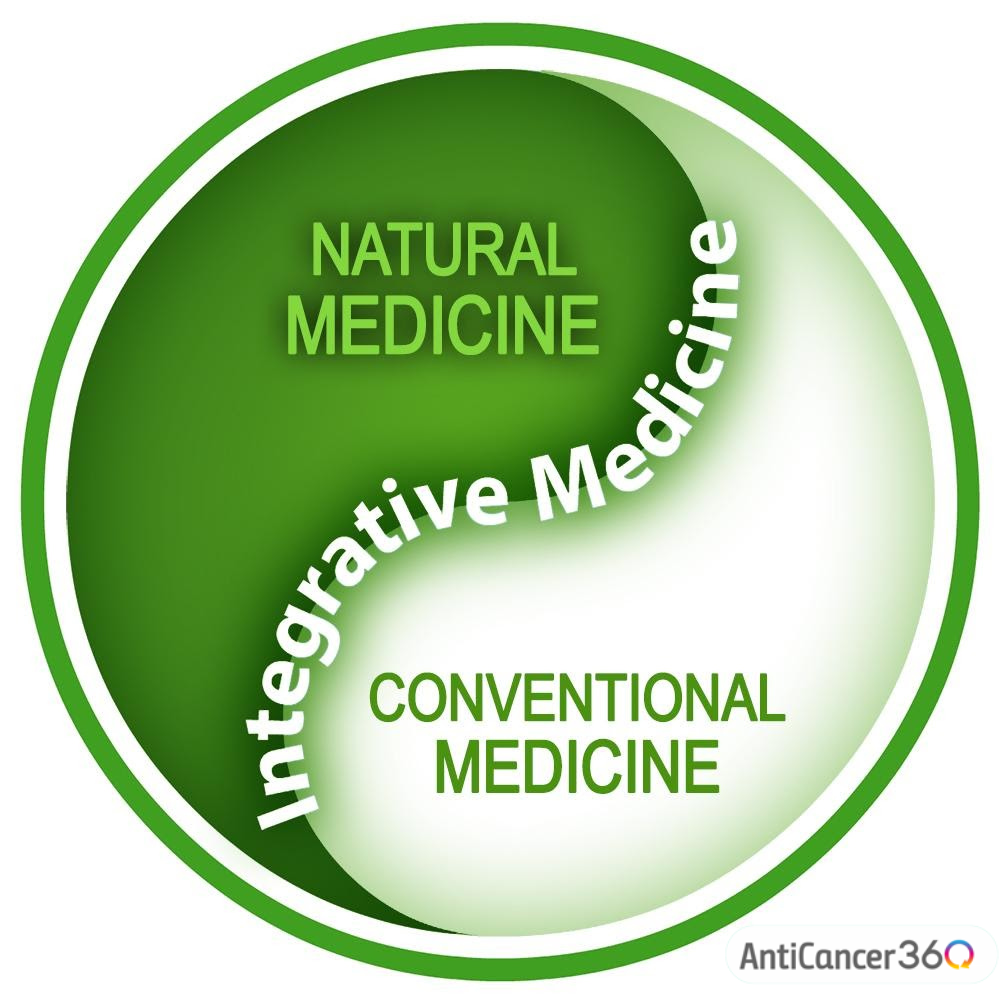
So in the context of cancer… conventional medicine includes things like surgery, chemotherapy, radiotherapy, targeted therapy, and immunotherapy.
And with integrative medicine… complementary and alternative therapies are then used to “complement” the conventional treatments. So this could include things like dietary therapies, natural supplements, acupuncture, meditation, tai chi, yoga, herbal medicine, etc…
But in most cases, these complementary therapies are focused on the side effects of the conventional treatments… and to support the person’s overall well being. This type of approach that you’ll usually find with integrative programs at university hospitals and/or major cancer centers that utilize integrative medicine.
So overall… this “standard type of integrative medicine” is great. And using complementary therapies in this way IS important.
But I also think it’s too limited in many cases. This is why we differentiate the AntiCancer360 approach as an “Aggressive Integrative Approach.”
Get MORE Anticancer Benefits… With Little To No Risk
An Aggressive Integrative Approach is more proactive. And, beyond just helping with side effects… we can also use a variety of natural anticancer strategies to help your body fight the cancer.
And most importantly, this can be done with little risk.
So why would you want to do this?
Because science is finding GREAT potential for many of these natural anticancer strategies to help against cancer. But most of these studies are performed on animals, and they are not repeated on humans (even when animal studies show GREAT potential.)
But… since we’re talking about low risk natural strategies… you can still use them alongside your cancer treatments (if you want to do everything possible against the cancer.)
And most importantly, the risk of any adverse interactions is very low if these natural anticancer strategies are used appropriately. So… you basically have nothing to lose, and everything to gain.
Here are some examples of the benefits that you could get from these natural anticancer strategies…
Exercise As Good As Chemo In An Animal Study
The first comes from researchers at Duke University, Harvard, and Sloan Kettering Cancer Center. They did a joint study looking at the effect of exercise on cancer [1].
What they found was kind of shocking to me when I first saw it.
Because in this animal study… they compared the anticancer cancer effects of:
- aerobic exercise
- a common chemotherapy drug (cyclophosphamide)
- and both of them in combination
Ultimately, they found that exercise + chemotherapy worked better than either one alone.
But the shocking thing about this study?
Aerobic exercise did JUST AS WELL as the chemotherapy in fighting the cancer (in this case.)
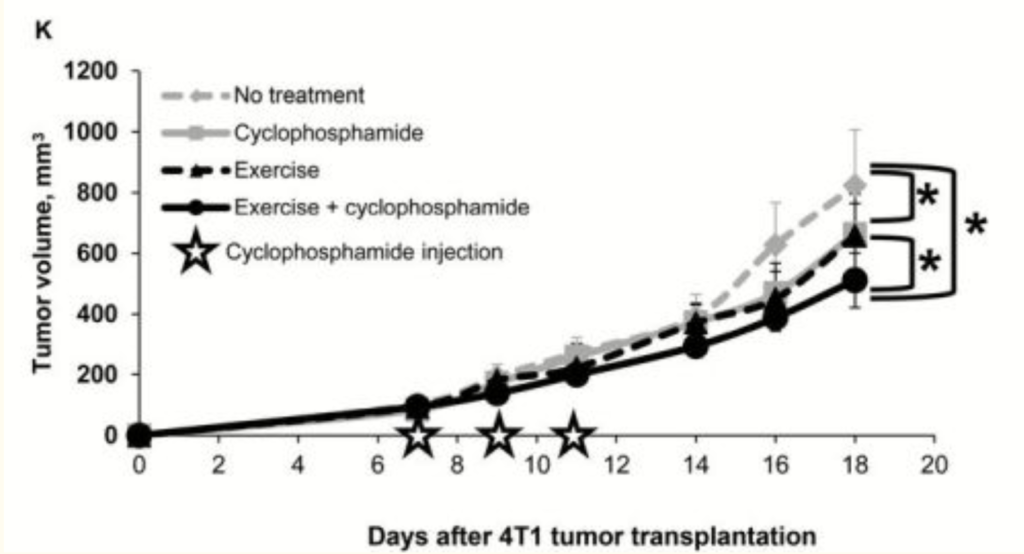
Now… I’m sure many oncologists recommend exercise to their patients.
But out of the many cancer patients that I’ve worked with… NOT ONE of them was told about this study, and just how important exercise could be. So they figured that exercise was just a healthy thing to do… not that it could potentially be as important as their cancer treatment.
And in many cases, exercise doesn’t even enter the conversation with the oncologist. Their focus is on treatments like chemo, radio, and surgery. And if this is ALL that you’re doing… you’re definitely not doing EVERYTHING possible against the cancer.
Beyond this… the possibility that something could be as good as chemotherapy without the damaging side effects, would seem like a high priority research topic to me.
But, I’m not aware of any human studies that followed up on this (i.e. exercise alone as a form of cancer treatment.)
So this is an example of aerobic exercise alone having HIGH potential for anticancer benefit. But it hasn’t been followed up with human studies.
Now, to be clear… I don’t think it’s good to rely on JUST exercise alone to treat cancer. And I can imagine how hard it would be to get a study like this approved… especially from an ethics perspective.
But… considering all of the people around the world who are opting to treat their cancers naturally (with unproven, or yet to be proven methods…) you would think that a study like this could be done on humans. At least a study of exercise combined with other anticancer strategies that have shown potential in preclinical studies.
Because ultimately… people who are opting for natural unproven treatments are looking for a non-toxic, or less toxic approach to cancer.
Nevertheless… this lack of research puts aerobic exercise in a scientific “gray area” when it comes to cancer.
The “gray area” is that it’s not proven in terms of “gold standard evidence….” But science has shown it to have great POTENTIAL for benefit against cancer.
Now… if there was a new cancer DRUG in this “gray area…” it WOULD NOT be something that you’d want to try. Because the risk of damaging side effects would be likely be high… and you wouldn’t want to risk it, without having “gold standard evidence.”
But exercise is very different than an experimental drug.
Exercise is a very low risk strategy. The potential risk would be MAGNITUDES lower than an experimental drug… probably close to nothing in most cases.
And it’s something that is already recommended to cancer patients anyways [2] (though again… it’s importance is rarely emphasized, in our experience.)
Now… this is a “less controversial” example since exercise is already recommended for cancer patients in general.
But the point is that most people aren’t INFORMED about HOW beneficial something like exercise could be. This is why our slogan here at AntiCancer360 is, “Get Informed | Take Control.”
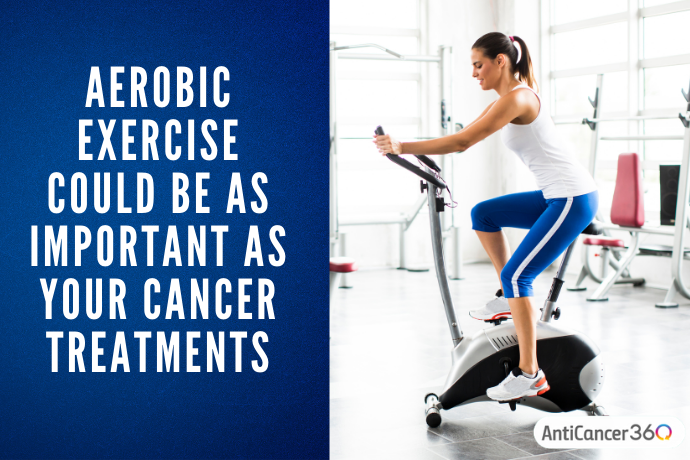
And you saw from the study above… exercise could be AS IMPORTANT as your cancer treatment itself. I think a lot of cancer patients would start exercising more if they knew about this study.
But let’s talk about some other examples… examples that get into the more “alternative side” of an “Aggressive Integrative Approach.”
Natural Compounds Do As Well, Or Better Than Drugs In Some Studies
Let’s start with an herbal compound called “Artemisinin.” This comes from the sweet wormwood plant (artemisia annua.) This is an herb that has been used in Chinese Herbal Medicine for hundreds of years (in Chinese it’s called “Qing Hao.”)
In Functional Medicine, we also use artemisinin against parasites… especially in the digestive system.
Now… one of the key scientists who discovered Artemisinin actually won the 2015 Nobel Prize [3] for this discovery. But while this research was focused on using Artemisinin against malaria… Artemisinin also uses the same mechanism to kill cancer cells [4].
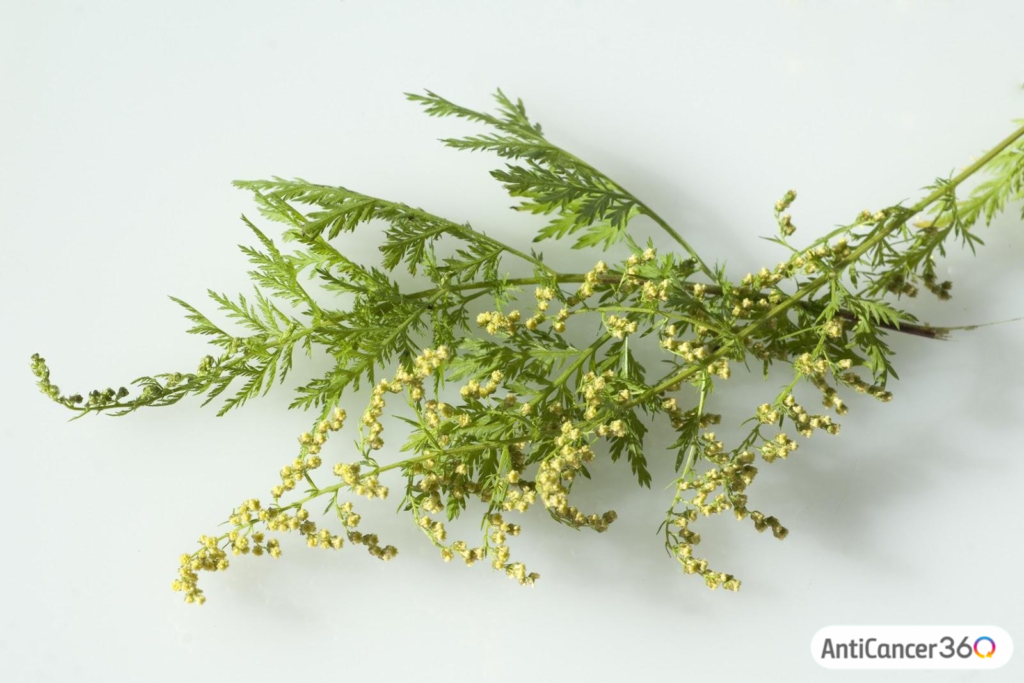
Because of this, many researchers have been looking into artemisinin against cancer, with some very interesting findings.
In one German study, researchers tested these things below against lymphoma cells in a petri dish [5].
They tested:
- Artesunate, an artemisinin derivative that allows for better absorption.
- Rituximab, a drug that’s often used for this type of cancer.
- And a combination of the two.
What they found was the combination of the two worked the best.
But… artesunate itself, GREATLY outperformed rituximab against the cancer cells.

In another study from researchers in Norway… the same artemisinin derivative was compared to a variety of drugs that are used, or are being studied for lymphoma [6].
These particular researchers found that artemisinin performed just as well, and usually better than many of these drugs, against a variety of different lymphoma cell types.
They also found that artemisinin had more of a “broad spectrum effect” compared to the other drugs.
So… other drugs may have done well against some types of lymphoma cells… but not so well against another type.
But artemisinin did quite well across the board, with all the different types of lymphoma cells. This is important because a single cancer is usually made up of many different cancer cell types [7].
Two people with the same type of cancer can have different cancer cell types. Even one person’s tumor can be made up of different cancer cell types. So this “broad spectrum effect” can be important.
And it’s not just artemisinin…
Natural Compounds In Combination, Outperform a Chemo Drug
Here’s another example from researchers at the University Of Louisville. These researchers tested different combinations of beta glucan, with other compounds like vitamin C and resveratrol [8].
Beta glucan is something you find in mushrooms for example. It works by stimulating your immune response against cancer.
Resveratrol is what you find in red grapes, and has shown a variety of anticancer effects.
And vitamin C, though mostly known for being in citrus, can be found in guavas and kiwi fruits in higher amounts.
Note: I mention these foods sources so you have a better idea of the substances overall. But you’d generally want to use a supplement in order to reach therapeutic doses.
So these researchers tested combinations of these natural substances. And they also compared them to a common chemotherapy drug called cyclophosphamide (the same drug in the exercise+chemo study that we talked about earlier.)
The amazing thing was how these things compared in terms of reducing lung metastasis.
What they found was:
- Cyclophosphamide reduced lung metastasis by 70%
- Beta Glucan + vitamin C reduced lung metastasis by 65%
- Beta Glucan + resveratrol reduced lung metastasis by 67%
- Beta Glucan + resveratrol + vitamin C reduced lung metastasis by 86%
So as you can see… beta glucan + resveratrol + vitamin C outperformed the chemotherapy drug in this experiment.
Even the 65 to 67% reduction from the beta glucan + vitamin C or resveratrol is already good when you weigh in the damaging side effects of chemotherapy.
So… science has provided us with these types of examples… Examples of natural, more biologically friendly approaches showing a high potential against cancer.
But here’s perhaps the MOST important point… These techniques are still unproven.
This is why we advocate an “Aggressive Integrative Approach” rather than an “alternative approach.”
Low Risk + High Potential= Why Wait?
Now… if you talk to a doctor or a scientist about this type of information… their most natural response would be something like:
“These are just preclinical studies. And many things that work well in the petri-dish, or animals, don’t end up working with humans.”
And this is TOTALLY true… but that doesn’t mean you shouldn’t use these strategies either…. especially if you’re NOT forgoing other proven treatments.
For example… we often have people use artemisinin between cycles of their oncologist’s treatments. This way your body is still being supported against cancer during these “off treatment times.”
In fact, I tell people “You should take advantage of this time in between cycles of your oncologist’s treatments. Because TIME is the #1 most precious thing when your fighting cancer… especially advanced or ‘terminal cancer.’”
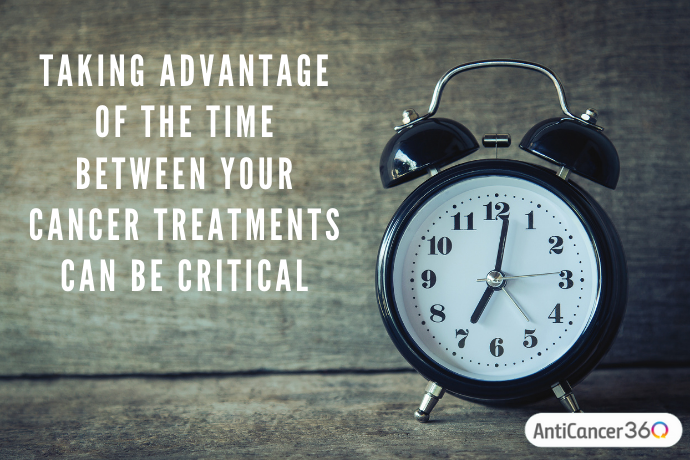
And though artemisinin does have risk for toxicity if used inappropriately… it’s been widely used for other purposes for a long time, and is safe when used correctly.
You could also use beta glucan during your oncology treatment. Then you can combine it with resveratrol and vitamin C between your oncology treatments. This minimizes any risk of interactions, and can also protect your immune system during your treatments. And this strategy has an extremely low risk for toxicity, or adverse reactions.
Now… these are just general examples. Because the best approach for you would depend on your particular case.
But considering the low risk profile of these “unproven” anticancer strategies… and their high potential for benefit… waiting for the “gold standard evidence” would be foolish in most cases… especially if your cancer is advanced.
Because, you may end up waiting for a LONG TIME for the science to be conducted… time that you don’t have when you’re fighting cancer.
Using Natural Approaches That Are “Guided by Science”
This is why I say that the approaches we discuss on AntiCancer360 are “guided by science.” But they aren’t necessarily “evidence based.”
Because as you can see with the studies above… the full “gold standard evidence” isn’t always available. and these topics are often neglected, and not followed up with human studies or repeated for accuracy… despite being very important in my opinion.
And waiting for the gold standard evidence could take decades… for strategies that you can use now with little risk.
Most importantly… I’ve worked with many patients and clients that would have died if they waited for researchers to fully study a technique (that ended up working well for them.)
Especially in cases where the likelihood of success is low with conventional treatment alone… adding these “unproven” strategies could be the difference between failure and success.
Aggressive Integrative Approach Depends On Your Situation
Now, this type of approach is not “one size fits all.” Rather, it depends on your particular situation, and how you want to approach your case.
Here’s the spectrum of medicine as I see it, from conventional to alternative.
Here’s where I would put “integrative medicine” in most cases. Again, this is what you’d mostly find at a university hospital that has an integrative medicine department (i.e. the natural strategies are focused on side effects and well being support… not so much the cancer itself.)
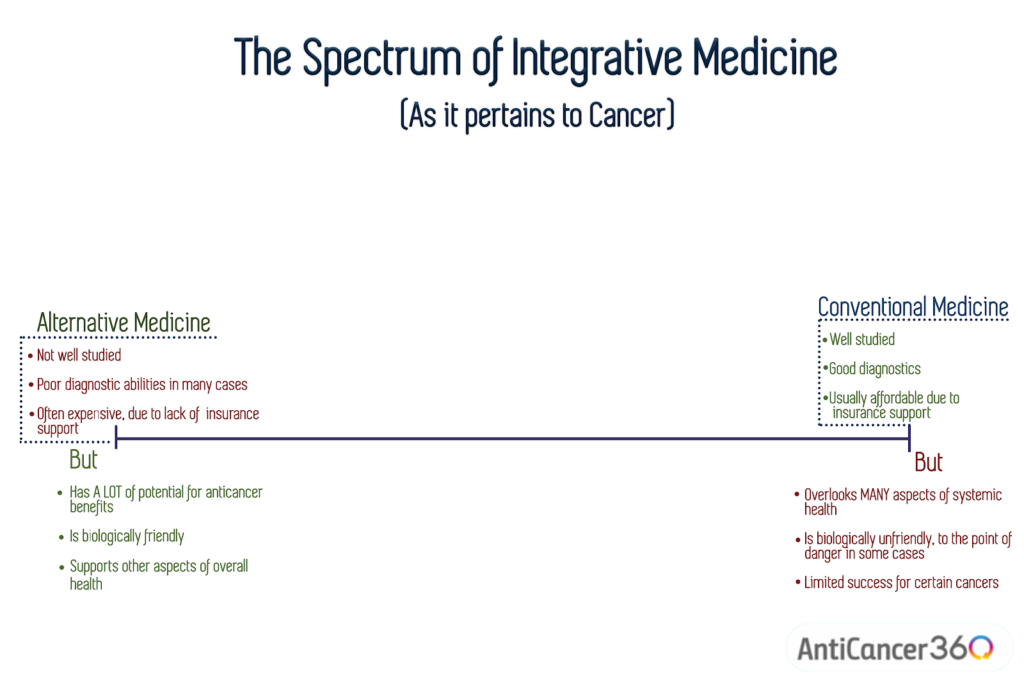
But here is where I would put an “Aggressive Integrative Approach.”
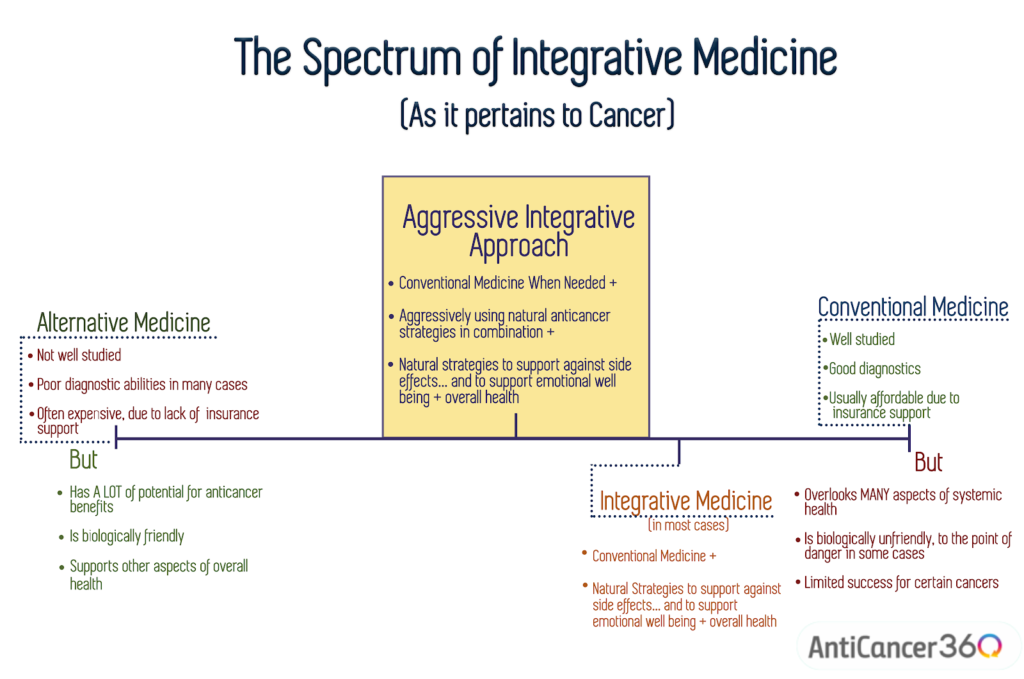
As you can see… it’s a spectrum. And in some cases, it may be better to go a little more toward the conventional side… or a bit toward the alternative side. It really just depends on the case.
Let’s say for example, you have testicular cancer. This is something that is known to respond to conventional medicine very well.
In this case, you may veer toward the most conventional side of the aggressive integrative approach. So this could mean minimizing your supplement program, or taking them only between cycles of treatment. This minimizes or eliminates any risk of interfering with your oncologist’s treatment.
But let’s say you have a glioblastoma multiforme… or an inoperable stage IV pancreatic cancer. These are both forms of cancer that have a very low chance of cure with our current cancer drugs. So in cases like this you may want to veer a little, or a lot more toward the alternative side… while still following your oncologist’s treatments.
Because in cases like this… conventional medicine alone has a lower (or even low) probability of success.
So you may want to opt for more supplements that could be synergistic… and use them with your oncologist’s treatments.
Or… you may ask them to alter the treatment timing a bit. This way you can have a few extra days for other strategies to help your body recuperate from treatment. And in this case, you’d still be supported by other anticancer strategies during this “off period.”
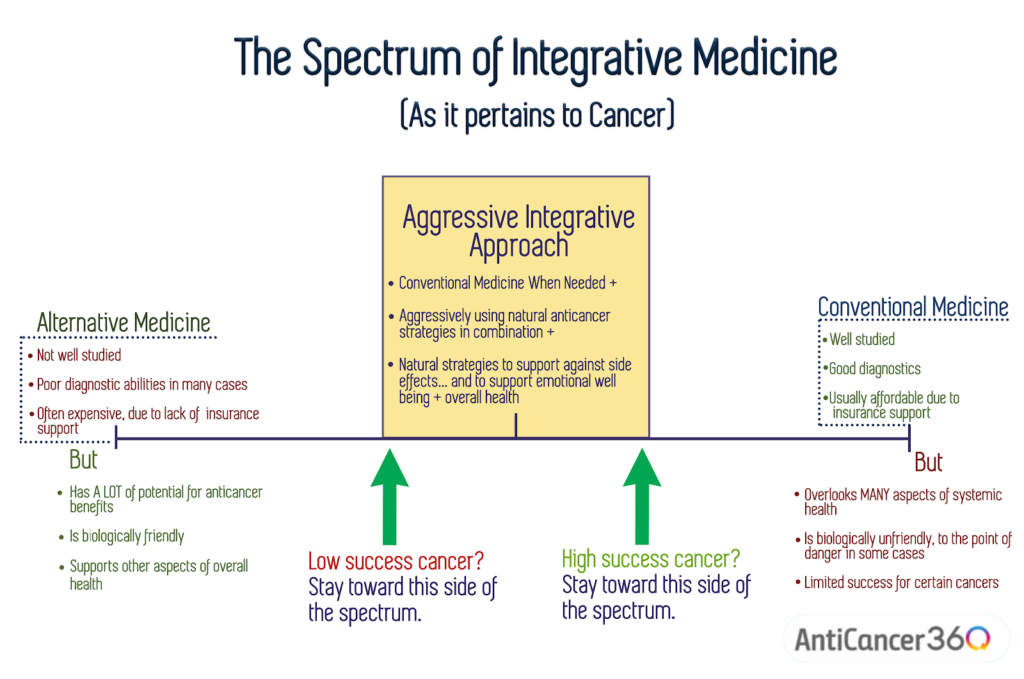
Basically… the LESS your oncologist is able to do for your type of case (statistically…) the more YOU should do in terms of your “overall anticancer program.”
This way you’re being supported against the cancer in every way.
Budget and “The Unknown” Are The Main Risk… But The Risk Is Low
But as with everything in life… everything has trade offs. And up until now, we’ve talked about how to get the best of both worlds in terms of conventional medicine, and natural anticancer strategies.
So what’s the trade off here? What’s the risk?
Well, aside from the small risk that even natural therapies could pose… the main risk is to your budget.
Because unlike methods that are well studied by science… we don’t have statistics of how often these natural methods can help… nor to what degree.
All we really know in most cases, is that they have a good potential for benefit. We also have a rough idea of what we think will help, based on past experiences (i.e. clinical and consulting experience.)
So the worst case scenario is that you try one of these strategies, and maybe it doesn’t work for you. There’s little risk of any physical harm. But… it could stress you financially to some degree if it doesn’t work (i.e. money wasted).
So… some of these natural anticancer strategies may not be for you if it’s too much of a strain on your finances.
But even then… there are low cost strategies that you can still use (i.e. exercise is free, and you have to buy food anyway).
It’s also important to put this into perspective, since money is wasted with conventional treatments all the time.
Because even “proven treatments” will work very well for some people… ok for others… and not so well in some cases.
Let’s look at an example of this with some very commonly used chemotherapy treatments.
“FOLFOX” is a combination regimen of three chemo drugs: leucovorin (folinic acid), 5-fluorouracil (5-FU), and oxaliplatin.
A common variation on this chemotherapy regimen is “FOLFIRI” (leucovorin, 5-FU, and irinotecan).
In a cost analysis study by the Northeastern University School of Pharmacy in Boston, the costs per treatment cycle were [9]:
- $49,031 for FOLFOX
- $36,922 for FOLFIRI
These costs were based on the average drug costs in 2011, plus the average healthcare costs associated with clinic visits and hospitalizations due to adverse drug reactions.
With these two regimens, this study found that the chances of survival for people with metastatic colorectal cancer were similar:
- 52% of people survived 18 months with FOLFOX
- 50% of people survived 18 months with FOLFIRI
And their analysis assumed that each person received 10 cycles of chemotherapy. So the treatment costs with these chemotherapy programs can run close to half a million dollars per person.
So when you consider this study, with either regimen… approximately 48% to 50% of people did not survive 18 months. So if you happen to be a “poor responder…” this in essence was a “waste of money” also.
Now, of course we know it is extremely difficult to put a price on the possibility of increased survival.
But when you’re considering the possibility of “wasting money” on a treatment that may not even work… most conventional treatments cost more than most peoples’ annual salaries. And unlike natural anticancer therapies, there are often damaging side effects to deal with when it comes to conventional treatments… some of which can be long term and severe.
So knowing this can help put things into perspective when you’re considering adding natural anticancer strategies into your overall program.
The bottom line is that natural anticancer strategies pose relatively low financial risk. But, the potential benefits of these against cancer can be immense.
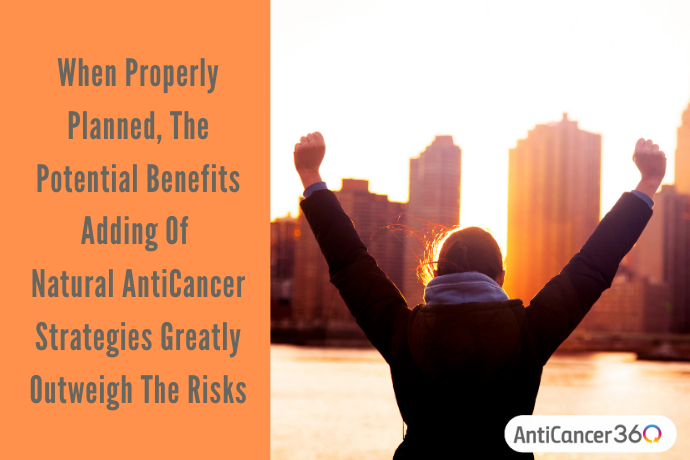
Aggressive Integrative Vs. Alternative Approach To Cancer
Now, like we mentioned before… natural anticancer strategies don’t have conclusive evidence to support them at this time.
And this “lack of conclusive evidence” is also why we advocate an “Aggressive Integrative Approach” over an “alternative approach” to cancer.
Because… even if a certain treatment has helped some people in the past… that doesn’t give you any idea of how likely it is to help you.
Many people will tell me that they heard about a case where someone was healed with an alternative treatment. And while I don’t doubt that this could be true or possible… I’ve also worked with MANY people who had alternative treatments fail on them.
And many of them tell me that many (or even most) of the people who were treated alongside them with alternative treatments also failed to be cured.
This is why we need scientific research to tell us the probability of success with a certain treatment. This is also why we shouldn’t just rely on hearsay.
Another reason we advocate an “Aggressive Integrative Approach” over an “alternative approach” is financial sustainability.
Many alternative approaches can be VERY costly. We often talk to people who spent $50k to $100k on alternative treatments and quickly ran out of money.
And while it’s not uncommon (from our experience) for some of these alternative treatments to show some benefits… many people don’t realize that the $30k to $60k cost of treatment is only for ONE CYCLE of treatment… and that cancer treatments often take MANY cycles of treatment if it is able to resolve the case (especially in advanced cases.)
So I often say that if you don’t have $70K-$100K of disposable income (plus some funds left over to use on another approach, if the alternative treatment doesn’t work…) then an alternative treatment probably isn’t the best choice for you.
Because, if a person spends all of their finances on alternative treatments… and the treatment either fails, or they run out of money before the treatment can resolve their case… then they’ll have nothing left to fund a different approach. And in advanced cases especially, conventional treatment alone just won’t be enough.
And while we all know that conventional treatments are very costly, they also benefit from the health insurance infrastructure which is a very important point. Because of health insurance, the direct cost to patients is relatively low for conventional treatments.
So in terms of financial planning (which is a VERY important part of fighting cancer,) taking advantage of health insurance support can be a CRITICAL aspect of fighting cancer effectively.

Most importantly… an Aggressive Integrative Approach let’s you take advantage of proven oncology treatments which are usually covered by health insurance… AND take advantage of natural anticancer strategies in a MUCH more financially sustainable way.
Ultimately… we advocate a person’s right to choose whatever treatments they want. But the important thing is to be well informed about your various options.
So even if you want to do an “alternative approach…” we support your right to do so. And some of these natural methods may very well prove to be effective in the future.
But until that research has been done, we don’t advocate a purely alternative approach to cancer.
This is why we recommend getting the best of both worlds with an “aggressive integrative approach.”
Get Informed… Take Control
So as you can see… there are a lot of things that can be done in addition to your oncologist’s treatments. And especially with more severe cases, these techniques could be the difference between failure and success.
This is why we call ourselves AntiCancer360. Because the goal is to fight cancer from every angle possible.
But we say “Get Informed | Take Control” because that’s exactly what you need to do if you want to fight cancer in every way possible.
Because as you saw with our previous examples… there’s a lot of amazing science that most people don’t know about. Science that could save their lives, if they knew how to apply it to their case.
This is why we created AntiCancer360. And our approach is focused on these types of science guided anticancer strategies.
But this is not something that your oncologist is going to do for you. That’s not really their job. Their focus is on using the techniques in which they’ve been trained.
Your job is to do everything else…
Take a look at this chart created by the IM4US and Ben Brown MD. It illustrates the spectrum of medicine from an integrative medicine perspective.
When it comes to conventional medicine (the more narrow part of the pyramid) there is less personal responsibility required. In surgery for example, you don’t have to do much. The work is done for you. With chemotherapy, you just have to go in for an infusion a few times a month in most cases.
But with natural anticancer strategies (labeled as CAM Therapy) on the chart… there is a lot more personal responsibility. Because, once you know what you need to do… you still have to control your diet, exercise, practice relaxation, take your supplements multiple times a day, etc…
So here at AntiCancer360, we help you determine which of these anticancer strategies are most important for your case, and we help you implement them during your treatment process. This way you know that you’re doing all that you can to fight the cancer from all the different angles.
And especially in advanced and “terminal” cases of cancer… These additional anticancer strategies can be the extra support that you need to succeed.
So… be sure to explore our site for more resources. And stay tuned… we’ll be exploring more of these topics with our upcoming articles (as well as videos and podcasts in the future.)
Or if you’re interested in working with us on your case… you can learn more about our program by watching one of our free online webinars.
What Are You Doing To Strengthen Your Personal Battle with Cancer?
So now we’d love to hear from you. How are you approaching your treatments? Are you using any anticancer strategies aside from your oncologist’s treatments? If so, what has been your experience been like so far? Let us know in the comments below!
Are You A Candidate For Our Program?
If you’d like to learn more about the AntiCancer360 approach and see if we can help you… please watch our free online webinar to learn more about our approach. Then at the end, you’ll be able to schedule a free call with someone from our team so that we can discuss your case in more detail.
Gene Wei is a Board Certified Doctor of Oriental Medicine in the state of Florida, and the founder of AntiCancer360. He’s also a graduate of the University of California Los Angeles, and East West College of Natural Medicine.
His practice is focused on integrative and natural anticancer strategies. Over the years, he’s helped many people overcome difficult cancers… including some cases of “terminal cancer” which were able to be reversed with an “Aggressive Integrative Approach.”




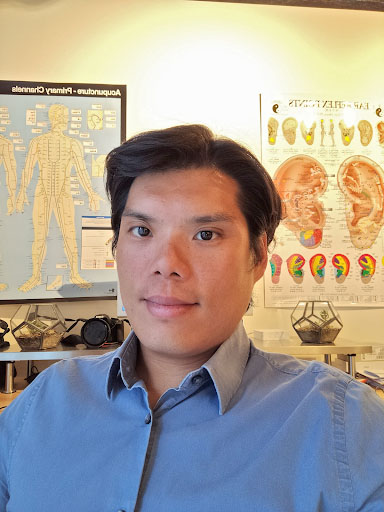
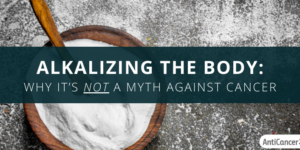


I had stage 1 er+ Breast Cancer I was in letrozole almost 7 years in remission I’m very interested in natural products started taking natural aromatose inhibitors .
Hi Gloria!
So since you’re not currently under treatment, you can consider alot of the natural anticancer compounds that we talk about throughout our blog. Many of them have great potential in terms of recurrence preventions (we call it “aftercare.”)
But of course, please make sure to consult with your physician before adding any supplements to your daily routine, since there could be interactions with your prexisting medications.
I have tried to get to where I can book that free phone call with you, but have been unsuccessful. I have estrogen feed breast cancer metastasized to spine. Very interested in talking and learning more about working with you. Please advice how I can do this?
Hi Deanna,
Please feel free to use this link here to book a free assessment call with someone from our team: http://anticancer360.com/call
During you call we can go over your case in more detail and answer any questions you have 🙂
I will start chemo on 6/24.
My diagnosis is metastatic pancreatic cancer.
Should I wait until I have done that treatment to schedule a call with you.
And what is the cost of your program. I am a retired teacher on a fixed income so I would like to know if I can afford it. I don’t have a lot of money.
Hi Cheryl! Please take a look at our webinar: https://anticancer360.com/work-with-us/
You’ll see that there are other ways to approach your case. And, we do it in a way that can increase the benefit of your current treatments (so no need to wait to start our protocol before finishing your treatments. We have a couple of pharmacists on our team who make sure there are no negative interactions with your current medications). Most importantly integrating our treatments with your current ones, can change your probability of having a great outcome.
We offer a few different programs, but we do require a monthly supplement budget of $500. This is not about the money, but more about what we need to build a comprehensive program for you. We also offer outside financing if that is something you are interested. Please feel free to email us at support@anticancer360.com for more information.